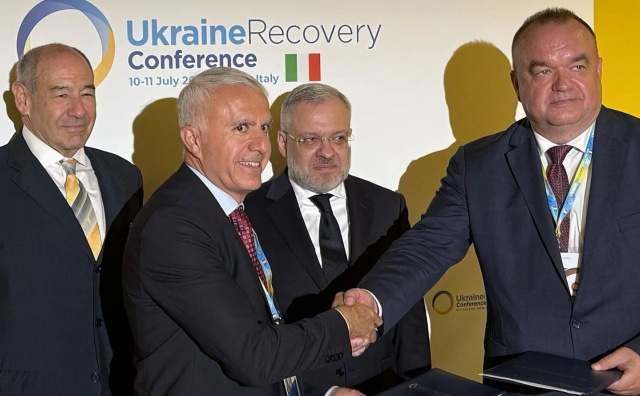
@M3 Communications Group, Inc.
In a significant step toward strengthening Ukraine’s energy independence, Westinghouse Electric Company and Ukraine’s state-run Energoatom signed an agreement to launch the construction of a joint nuclear fuel fabrication facility within Ukraine. The signing took place during the Conference on the Reconstruction of Ukraine, underscoring international support for the country’s long-term energy resilience.
The agreement aims to deepen cooperation between the two companies on securing a stable supply of nuclear fuel for Ukraine’s fleet of VVER reactors. Westinghouse’s VVER fuel solution remains the only fully Western alternative available on the market, providing a strategic route away from Russian supply chains.
Petro Kotin, Acting CEO of Energoatom, and Aziz Dag, Senior Vice President of Westinghouse’s Global BWR and VVER Fuel division, signed the Declaration of Cooperation in the presence of Ukraine’s Minister of Energy, Herman Halushchenko. Under the agreement, a production line for nuclear fuel elements will be built at AtomEnergoMash, a subsidiary of Energoatom. The final contractual details are expected to be finalized in the coming period.
Earlier this year, Westinghouse certified AtomEnergoMash as a qualified producer of key components – specifically, heads and tails – for fuel assemblies used in Ukraine’s VVER-1000 nuclear reactors. This milestone laid the groundwork for the upcoming construction of a modern fuel assembly plant inside Ukraine’s borders.
Petro Kotin emphasized the importance of the agreement, describing it as another step in Ukraine’s journey toward domestic fuel production using Westinghouse’s cutting-edge technology. “Our goal is to establish Ukraine as a hub for nuclear innovation in Eastern Europe,” he said, expressing appreciation for the continued trust and cooperation from the company’s American partner.
Tarik Choho, President of Westinghouse Nuclear Fuel, reaffirmed the company’s long-term commitment to energy security in Ukraine. He noted Westinghouse’s strong track record of delivering high-performance VVER fuel over two decades. “This technology is critical not just for Ukraine, but for countries across the region looking to diversify away from Russian fuel sources while advancing their zero-carbon energy goals,” he added.
Beyond supplying fuel for Ukraine’s current nuclear infrastructure, Westinghouse is also working on a broader nuclear expansion. The company plans to build nine AP1000® reactors in Ukraine. These Generation III+ reactors, the only ones of their class currently in commercial operation, feature passive safety systems, a modular design, and the lowest CO₂ emissions per megawatt of power generated.
Currently, six AP1000® reactors are breaking records for operational efficiency worldwide. Another twelve are under construction, and six more have received construction approval. By 2030, 18 units are expected to be fully operational. The technology has also been selected for use in Poland and Bulgaria, and is under consideration for deployment at various locations in Europe, the UK, and North America.
Source: M3 Communications Group, Inc. press release